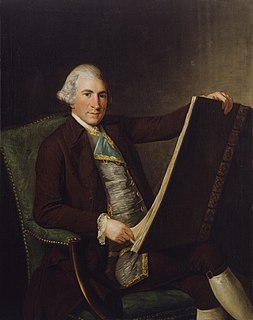
Robert Adam was a British neoclassical architect, interior designer and furniture designer. He was the son of William Adam (1689–1748), Scotland's foremost architect of the time, and trained under him. With his older brother John, Robert took on the family business, which included lucrative work for the Board of Ordnance, after William's death.

Earl of Derby is a title in the Peerage of England. The title was first adopted by Robert de Ferrers, 1st Earl of Derby, under a creation of 1139. It continued with the Ferrers family until the 6th Earl forfeited his property toward the end of the reign of Henry III and died in 1279. Most of the Ferrers property and the Derby title were then held by the family of Henry III. The title merged in the Crown upon Henry IV's accession to the throne in 1399.

Edward Smith-Stanley, 13th Earl of Derby, KG, of Knowsley Hall in Lancashire, was a politician, peer, landowner, builder, farmer, art collector and naturalist. He was the patron of the writer Edward Lear.

Edward Smith-Stanley, 12th Earl of Derby PC, usually styled Lord Stanley from 1771 to 1776, was a British peer and politician of the late eighteenth and early nineteenth centuries. He held office as Chancellor of the Duchy of Lancaster in 1783 in the Fox–North coalition and between 1806 and 1807 in the Ministry of All the Talents.
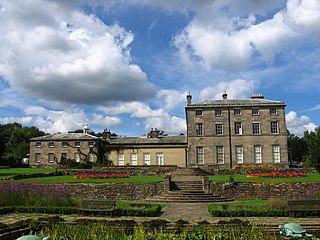
Allestree is a suburb and ward of the city of Derby, a unitary authority area, in Derbyshire, England. It is the northernmost ward and is situated on the A6 road, about 2 miles (3 km) north of Derby city centre. It is bordered by the district of Amber Valley along its western and northern edges and Erewash in its north-east corner. To the south it borders the ward of Mackworth and to the east the ward of Darley Abbey.
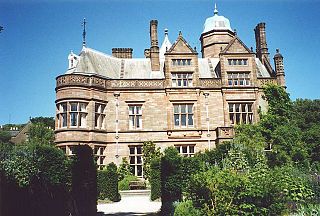
Holker Hall is a privately owned country house located about 2 km to the southwest of the village of Cartmel in the ceremonial county of Cumbria and historic county of Lancashire, England. It is "the grandest [building] of its date in Lancashire ...by the best architects then living in the county." The building dates from the 16th century, with alterations, additions, and rebuilding in the 18th and 19th centuries. The 19th century rebuilding was by George Webster in Jacobean Revival style and subsequent renovations were by E. G. Paley. Hubert Austin had a joint practice with Paley by the 1870s and they both rebuilt the west wing after it was destroyed by a major fire in 1871, only a decade after Paley's previous work on the structure. The fire also destroyed a number of notable artworks. Holker Hall is Paley and Austin's "most important country house commission." The architectural historian Nikolaus Pevsner expressed the opinion that the west wing is the "outstanding domestic work" of Paley and Austin. In 1970 the hall itself, together with its terrace wall, were designated Grade II* Listed buildings. The house stands in an estate of about 80 hectares, and is surrounded by formal gardens, parkland and woodland. Within the grounds are six structures listed at Grade II.

Knowsley Hall is a stately home near Liverpool in the Metropolitan Borough of Knowsley, Merseyside, England. It is the ancestral home of the Stanley family, the Earls of Derby. The hall is surrounded by 2,500 acres (10 km2) of parkland, which contains the Knowsley Safari Park. Though the hall is still owned by the Stanley family, it is no longer a family home, but is instead used for corporate events, conferences and weddings. Since 1953 it has been designated a Grade II* listed building,
Edward Richard William Stanley, 19th Earl of Derby, is a British hereditary peer and landowner.
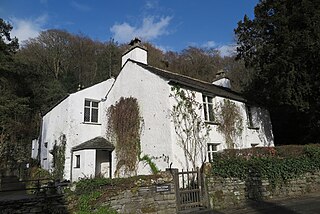
Dove Cottage is a house on the edge of Grasmere in the Lake District of England. It is best known as the home of the poet William Wordsworth and his sister Dorothy Wordsworth from December 1799 to May 1808, where they spent over eight years of "plain living, but high thinking". During this period, William wrote much of the poetry for which he is remembered today, including his "Ode: Intimations of Immortality", "Ode to Duty", "My Heart Leaps Up" and "I Wandered Lonely as a Cloud", together with parts of his autobiographical epic, The Prelude.

Hornby Castle is a country house, developed from a medieval castle, standing to the east of the village of Hornby in the Lune Valley, Lancashire, England. It occupies a position overlooking the village in a curve of the River Wenning. The house is recorded in the National Heritage List for England as a designated Grade I listed building.

Tarbock is a village and former civil parish within the Metropolitan Borough of Knowsley, in Merseyside, England. It is situated to the south east of Huyton and to the east of Netherley. The village itself is 6 miles (9.7 km) from Liverpool city centre, 3.5 miles (5.6 km) from Widnes and 2 miles (3.2 km) from Prescot. The M62 motorway junction 6 is in the area and is more familiarly called Tarbock Island. At the 2001 Census, the population of Tarbock was 2,382. The parish council was abolished on 1 April 2014.

The High Sheriff of Lancashire is an ancient officer, now largely ceremonial, granted to Lancashire, a county in North West England. High Shrievalties are the oldest secular titles under the Crown, in England and Wales. The High Sheriff of Lancashire is the representative of the monarch in the county, and is the "Keeper of The Queen's Peace" in the county, executing judgements of the High Court through an Under Sheriff.
Admiral Sir Phipps Hornby, was a prominent and experienced Royal Navy officer of the nineteenth century. Hornby served on frigates throughout most of his wartime experience, which included witnessing the Nore Mutiny first hand aged 12 in 1797. Later, commanding his own sixth-rate HMS Volage in 1811, Hornby played a vital role in the British victory at the Battle of Lissa. At Lissa a British squadron under William Hoste overwhelmed a French force more than twice their own strength, Volage combating a much larger ship alone for several minutes and taking numerous casualties, including Hornby, who was wounded.

Sharpe, Paley and Austin are the surnames of architects who practised in Lancaster, Lancashire, England, between 1835 and 1946, working either alone or in partnership. The full names of the principals in their practice, which went under various names during its life, are Edmund Sharpe (1809–77); Edward Graham Paley (1823–95), who practised as E. G. Paley; Hubert James Austin (1841–1915); Henry Anderson Paley (1859–1946), son of Edward, usually known as Harry Paley; and, for a very brief period, Geoffrey Langshaw Austin (1884–1971), son of Hubert. The firm's commissions were mainly for buildings in Lancashire and what is now Cumbria, but also in Yorkshire, Cheshire, the West Midlands, North Wales, and Hertfordshire.

Chevington is a village and civil parish in the West Suffolk district of Suffolk in East Anglia, England. Located around 10 km south-west of Bury St Edmunds, in 2005 its population was 630, reducing to 602 at the 2011 Census. The parish also contains the hamlets of Broad Green and Tan Office Green.
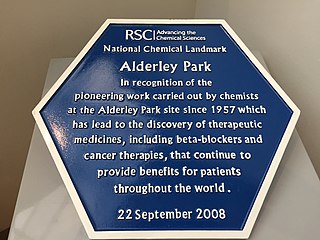
Alderley Park was a country estate at Nether Alderley, Cheshire, England, between Macclesfield and Knutsford. It was the residence of the Stanley family of Alderley from the 1500s. It became the headquarters of ICI Pharmaceuticals in the 1950s. It was purchased from AstraZeneca by Bruntwood in 2014. The site has an international reputation as a home for bio and life sciences.

Elizabeth Smith-Stanley, Countess of Derby was an English peeress. As the eligible eldest daughter of the 6th Duke of Hamilton, she married the 12th Earl of Derby in 1774, giving birth to three children. Lady Derby was popular among society and she organised a ladies cricket match. She was a leader of fashion alongside the Duchess of Devonshire.

Bewsey Old Hall is a brick built, three storey, mainly Jacobean building, incorporating or reusing elements of a former medieval hall situated on the edge of Sankey Valley Park in Warrington, Cheshire. Bewsey Old Hall and estate was home to the Lords of Warrington from the thirteenth to the seventeenth century.

Edmund Hornby (1773-1857) of Dalton Hall near Burton, Westmorland, was a Member of Parliament for Preston, Lancashire, from 1812 to 1826. He was a nephew and son-in-law of Edward Smith-Stanley, 13th Earl of Derby (1775-1851).
The Hon. Henry Thomas Smith-Stanley was a British politician. He was MP for Preston 1832–1837.

















